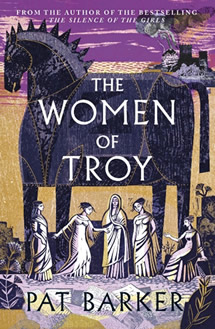Reviewed by Robert Goodman.
By Pat Barker, Penguin, $32.99.
 There have been plenty of retellings of Greek history and mythology of late (just recently – The Porpoise by Mark Haddon, Circe by Madeline Millerand Ariadne by Jennifer Saint) but one of the best of recent years was Pat Barker’s The Silence of the Girls. In that book Barker used the story of The Iliad and the siege of Troy told from the perspective of Briseis, a prize of war. She used the story as a scaffold to explore age-old themes of gender relations, power and misogyny. In The Women of Troy, Barker continues the story of Briseis in the aftermath of the Trojan War.
There have been plenty of retellings of Greek history and mythology of late (just recently – The Porpoise by Mark Haddon, Circe by Madeline Millerand Ariadne by Jennifer Saint) but one of the best of recent years was Pat Barker’s The Silence of the Girls. In that book Barker used the story of The Iliad and the siege of Troy told from the perspective of Briseis, a prize of war. She used the story as a scaffold to explore age-old themes of gender relations, power and misogyny. In The Women of Troy, Barker continues the story of Briseis in the aftermath of the Trojan War.
The Women of Troy opens with the story of the Trojan Horse. Inside the wooden offering is Pyrrhus, the son of Achilles, desperate to prove himself worthy of his now dead father. Following the fall of Troy, the bulk of the narrative reverts to Briseis, now pregnant by Achilles and married to Alcimus, who has many of the captured women and girls of Troy under her care. The Greeks are trapped on the beach by a strong, unceasing wind, and as the time stretches, tensions within the camp start to rise.
While Briseis is the focus of the book, Barker uses her to explore all of the many situations that the captured women of Troy find themselves in. These include famous characters – now hated, Helen, back in the bed of King Menelaus, her mother-in-law the widowed Hecuba, Hecuba’s daughter Cassandra who has prophesised King Agamemnon’s death, Andromache wife of Hector and now Pyrrhus’ prize of war. But it also includes the “girls” in particular Amina, Briseis’ shadow who seeks to defy Pyrrhus and bury King Priam. All of these characters find themselves in slightly different circumstances and all react in different ways.
But through all of this Briseis is the centre. Observant, wise, strong enough to support all of those who need it. Still bitter but learning to live with her guilt and pain. Caustic in her observations:
Then – and now – people seem to take for granted that I loved Achilles. Why wouldn’t I? I had the fastest, strongest, bravest, most beautiful man of his generation in my bed – how could I not love him?
He killed my bothers.
We women are peculiar creatures. We tend not to love those who murder our families.
While The Women of Troy goes over some ground from the previous book, it puts some new perspectives on that action. In particular, Priam’s visit to Achilles to retrieve the desecrated body of his son Hector. Once again, the gods are in the background of this story. While it is possible to see the action, particularly towards the end of the book as those gods working through people like the seer Calchas, the question of whether to believe in their intervention is left ambiguous.
When The Women of Troy ends the story of Briseis seems far from over. She herself implies a long life following the events on the beaches outside of Troy. And while her companions have been scattered there are still plenty more to the stories of these characters to provide the material for what feels like at least one more volume in this excellent series.











